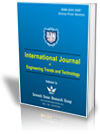Adaptive FIR Design Using Levinson Algorithm for Radio Frequency Interference Reduction
Citation
Rashmi Bawankar, Dr. Rajesh Mehra, Preeti Singh "Adaptive FIR Design Using Levinson Algorithm for Radio Frequency Interference Reduction", International Journal of Engineering Trends and Technology (IJETT), V30(6),289-293 December 2015. ISSN:2231-5381. www.ijettjournal.org. published by seventh sense research group
Abstract
The paper intends an adaptive filter design,based on Linear Prediction Technique. The Levinson-Durbinrecursiontechniquehas beenutilized here to obtain the filter coefficients while it also uses the autocorrelation method to estimate the linear prediction parameters for a segment of a random signal. The radio signals are of the frequency range between 10-100 MHz. The noise occurring in this frequency range is due to RFI or some other parameters like man made or machine made violations.The coefficients for the linear predictor (LP) are robustlycalculated in the MATLAB. The results shows that the Adaptive Levinson-Durbin algorithm used in Linear Prediction technique is more proficient as compared to theother methods appliedforreduction in radio frequency interference,as we have usedhere the FFT method for comparison which is non-adaptive in nature.
References
1) Z. Szadkowski, E.D. Fraenkel, D. G?as, R. Legumina, “An optimization of the FPGA/NIOS adaptive FIR filter using linear prediction to reduce narrow band RFI for the next generation ground-based ultra-high energy cosmic-ray experiment”, Nucl. Instr.Meth.,ser. A, vol. 732, pp. 535-539, June 2013.
2) ChanpreetKaur, Rajesh Mehra, “An FPGA implementation efficient equalizer for ISI removal in wireless applications”, IEEE Conference on Emerging trends in Robotics and Communication Technologies, pp. 96-99, 2010.
3) B. Kovac?evic´ et al., “Adaptive Digital Filters,” DOI: 10.1007/978-3-642-33561-7_2, Academic Mind Belgrade and Springer-Verlag Berlin Heidelberg, pp. 31-35, 2013.
4) Divya, Preeti Singh, Rajesh Mehra, “Performance Analysis of LMS & NLMS Algorithms for NoiseCancellation,” IJSRET, Vol 2, Issue 6, pp.366-369, 2013.
5) A Amrita, R Mehra, “Embedded Design of an Efficient Noise Canceller for Digital Receivers” International Journal of Engineering - Engg Journals Publications, 2011.
6) Z. Szadkowski, E.D. Fraenkel, A. M. van den Berg, FPGA/NIOS implementation of an adaptive fir filter using linear prediction to reduce narrow-band RFI for radio detection of cosmic rays, in: IEEE Real Time Conference, 2012.
7) A. Schmidt, H. Gemmeke, A. Haungs, K-H.Kampert, C. Rühle, Z. Szadkowski, IEEE Transactions on Nuclear Science 58 August 4 2011.
8) Jenkins, W. Kenneth, Hull, Andrew W.,Strait, Jeffrey C., Schnaufer, Bernard A., Li, Xiaohui, “Advanced Concepts in AdaptiveSignal Processing,” Kluwer Academic Publishers,1996.
9)MohitGarg, “Linear Prediction Algorithms,” IITBombay,pp.4, April 2003.
10) John G. Proakis and Dimitris G. Manolakis, “Digital Signal Processing- Principles, Algorithms, and applications” 3rd edition, pp. 223-225.
11) L. Gupta, Rajesh Mehra, “Modified PSO based adaptive IIR filter design for system identification on FPGA”, International Journal of Computer Application, vol.22, 2011.
12) Vikrant Vij, Rajesh Mehra, “FPGA based Kalman filter for wireless sensor networks”, International Journal of computer technology, vol.2, 2011.
13) Daphni S, Bamini S, Judith Johnsi J, Thavasumony D, “FPGA Implementation of Adaptive Filtering Algorithm for Noise Cancellation in Speech Signal”, International Journal of Engineering Trends and Technology (IJETT), vol.19,2015.
14)Kalyani R. Jambhulkar,”Various Reduction Techniques for Parallel FIR Digital Filter Using Parallel Architecture,” International Journal of Engineering Trends and Technology (IJETT), vol.25,2015.
Keywords
Adaptive FIR, Levinson recursion, Linearprediction, RFI, MATLAB.



